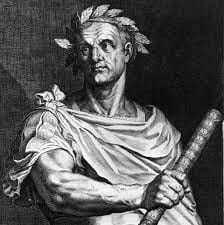Julius Caesar’s History: A Tale of Ambition, Triumph, and Legacy

Introduction
Julius Caesar stands as an emblem of Rome’s transition from Republic to Empire. His life, marked by political acumen, military prowess, and an untimely demise, remains a captivating saga that shaped the destiny of an empire. Delving into his early life, major achievements, key battles, pivotal moments, and lasting legacy.
Early Life
Born on July 12, 100 BCE, into the prestigious Julian gens, Julius Caesar hailed from a family with a storied lineage. His family claimed descent from the goddess Venus, further elevating their status in Roman society. Raised in the bustling heart of Rome, young Caesar witnessed the turbulence of political strife and social unrest that defined the late Roman Republic.
Caesar’s early years were marked by an innate ambition and a thirst for knowledge. His education in rhetoric and law laid the foundation for a career in politics, and he quickly ascended the political ladder. By 63 BCE, he had already been elected Pontifex Maximus, the chief priest of Rome, showcasing his ability to navigate the complex web of Roman politics.
Major Achievements
Julius Caesar’s meteoric rise was fueled by a series of strategic alliances and political maneuvers. Forming the First Triumvirate with Pompey and Crassus, Caesar solidified his power base. During his consulship in 59 BCE, he initiated a series of reforms aimed at addressing the socio-economic disparities that plagued Rome. These reforms endeared him to the masses while unsettling the conservative senatorial elite.
Key Battles Won
However, it was on the battlefield that Caesar truly etched his name in history. His conquest of Gaul from 58 BCE to 50 BCE showcased his military brilliance. The Gallic Wars, meticulously documented in his Commentarii de Bello Gallico (Commentaries on the Gallic War), marked a series of triumphs that expanded Roman territories and solidified Caesar’s reputation as an exceptional military commander.
The Battle of Alesia in 52 BCE was a pivotal moment. Facing off against the formidable Gallic leader Vercingetorix, Caesar employed innovative military tactics, including the construction of a massive fortification around the city of Alesia. This siege demonstrated Caesar’s strategic brilliance, securing his victory and solidifying Roman control over Gaul.
Pivotal Moments
Caesar’s crossing of the Rubicon River in 49 BCE marked a point of no return. Ignoring the Senate’s orders to disband his army, Caesar famously declared, “The die is cast.” This act of defiance against the Roman Senate set the stage for a civil war between Caesar and his former allies, Pompey and the Senate.
The subsequent conflict, known as the Roman Civil War (49–45 BCE), culminated in the Battle of Pharsalus in 48 BCE. Despite being outnumbered, Caesar’s forces emerged victorious, and Pompey fled to Egypt, where he met his demise. This victory solidified Caesar’s dominance, and he returned to Rome as the undisputed master of the Roman world.
Death and Legacy
However, Julius Caesar’s ascent also sowed the seeds of his downfall. On the Ides of March (March 15), 44 BCE, a group of conspirators, including prominent senators like Brutus and Cassius, assassinated Caesar in the Senate chamber. The assassination was a desperate attempt to preserve the Roman Republic, but it ultimately led to its demise.
Caesar’s death plunged Rome into chaos, sparking a power struggle that culminated in the rise of Caesar’s grandnephew and adopted son, Octavian (later known as Augustus), as the first Roman Emperor. The Roman Republic, which had endured for centuries, gave way to the Roman Empire.
Julius Caesar’s legacy endures not only in the political transformation of Rome but also in his contributions to literature and language. His Commentarii de Bello Gallico remains a classic work of military literature, providing insight into the mind of one of history’s greatest commanders. Moreover, the Julian calendar, instituted by Caesar, forms the basis for the modern calendar used worldwide.
Conclusion
Julius Caesar’s life was full of ambition, triumph, and tragedy. From his early days in Rome to the pinnacle of power, Caesar’s journey shaped the destiny of an empire. His military exploits, political maneuvering, and untimely demise left an indelible mark on the pages of history, forever immortalizing him as a pivotal figure in the transition from the Roman Republic to the Roman Empire.
Thank you for reading! Please fill out my follow form below to subscribe to my email list to never miss a blog.
https://thecourageouseffort.com/follow-me/
